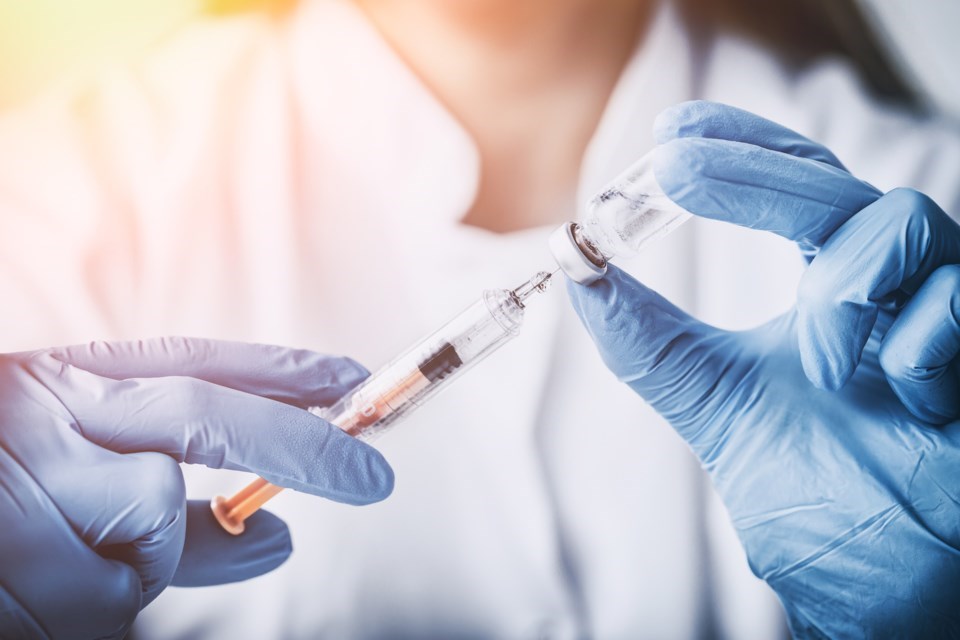Public Health Ontario is receiving reports of "adverse effects following immunization" (AEFI) now that COVID-19 vaccination efforts are underway across the province.
In a recent story by local journalism initiative reporter Len Gillis, data collected between Dec. 13, 2020 and April 24, 2021, a total of 1,878 events were reported in Ontario following 4,629,149 doses of COVID-19 vaccines administered, which is 00.04 per cent.
In all, 236 of all reported adverse events (12.5 per cent of the total number) occurred in Northern Ontario.
A total of 19 AEFI reports came from the Algoma Public Health region:
- Public Health Sudbury & Districts topped the list in the north and reported 63 incidents
- Northwestern Health Unit was next on the list with 48 incidents
- Porcupine Health Unit reported 37 incidents
- North Bay Parry Sound District Health Unit reported 30 incidents
- Timiskaming Health Unit reported 21 incidents
- Algoma Public Health reported 19 incidents
- Thunder Bay District Health Unit reported 18 incidents
PHO also provided statistics outlining the ratio of the event rate per 100,000 vaccine doses administered. This took in the full area serviced by a health unit and not individual communities.
- Northwestern Health Unit topped that list with 189.9 events per 100,000 doses.
- Timiskaming Health Unit's rate was 172.6 events.
- Porcupine Health Unit's rate was 136.4 events.
- Public Health Sudbury and District's rate was 95.5 events.
- North Bay Parry Sound's rate was 76.6 events.
- Algoma Public Health's rate was 53.8 events.
- Thunder Bay District Health Unit's rate was 30.1 events per 100,000 doses.
The rates reported above are not to be confused with actual events, but are only reported by PHO as a comparative ratio.
The most commonly reported adverse events were allergic skin reactions and pain/redness/swelling at the injection site, reported as 28.6 per cent and 25.4 per cent of the total AEFI reports respectively.
More than 96 per cent of events (1,815) were described as non-serious. There were, however, 63 AEFI reports that were described as serious, according to the PHO summary.
Two deaths were reported, but the deaths could not be directly attributed to COVID-19 vaccination.
"One report of death occurred in a resident of a healthcare institution with significant co-morbidities. The cause of death was not attributed to the vaccine,” reads the PHO summary. “The second report of death occurred in a community dwelling senior with complex cardiovascular and renal conditions, wherein the AEFI may have contributed to but was not the underlying cause of death."
There were also 34 reports described as "adverse events of special interest." PHO said half of those, 17 of the 34, were described as serious.
- Twenty reports of “coagulation disorder”, including three with thrombocytopenia, which can result in blood clots.
- Seven reports of “acute cardiovascular injury”.
- Three reports of “acute kidney injury”.
- Two reports of “anosmia and/or ageusia” (loss of smell, loss of taste).
- Two reports of “erythema multiforme” (skin rash).
- One report of “acute respiratory distress syndrome” (lung inflammation).
- One report of “single organ cutaneous vasculitis”.
Also included in the report are incidents described as "medically important events."
PHO said these were also adverse events based on the World Health Organization’s (WHO) guidance, regardless of whether they meet the serious AEFI definition. PHO said these types of events might jeopardize the patient or may require intervention to prevent an outcome described in the serious definition.
This included:
- Seven reports of thrombocytopenia: three following the COVISHIELD (AstraZeneca) vaccine, three following the Moderna vaccine and one following the Pfizer-BioNTech vaccine.
- Three reports of Guillain-Barré syndrome (GBS): two following the COVISHIELD vaccine and one following the Pfizer-BioNTech vaccine.
- One report of myelitis/transverse myelitis following the Pfizer-BioNTech vaccine
Several incidents occurred which PHO said were managed as anaphylaxis (serious allergic reaction) in which nine met the definition of a serious AEFI.
The entire PHO summary on AEFI reports can be viewed here.
